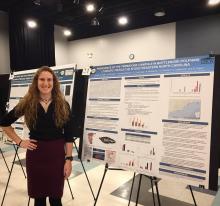My research experience began my sophomore year as a DIS student studying a parasite called Campula. This parasite invades the biliary tract of odontocetes and very little is known about its life cycle. My DIS work analyzed the prevalence and gross effect of Campula on tissues such as the pancreas, liver, and bile ducts of bottlenose dolphins. The project developed into my Honors thesis research and I have presented preliminary results at UNCW’s Spring Research Showcase and 2017 SEMAMMS (Southeast and Mid-Atlantic Marine Mammal Symposium) and I will be defending this December. I also received the 2016 NOAA Hollings Scholarship my sophomore year and completed my summer internship in 2017. I spent 3 months in Alaska investigating environmental drivers (such as oceanographic conditions, food resources, and energetics) that influence humpback whale movement in the Gulf of Alaska.
I became involved in my Honors project through my DIS with Dr. Pabst. My interest in cetacean anatomy in physiology inspired me to develop my project further into a senior thesis. I hoped to learn valuable skills that would be applicable to furthering my research at the graduate level. I also wanted to make connections and meet other cetacean researchers in hopes of creating a vast network to interact with. My advisor, Dr. Condon, suggested that I apply for the Hollings Scholarship and I was selected the spring of my sophomore year. I hoped to network with NOAA researchers and learn to use new scientific equipment for my Hollings Project.
I have been able to present preliminary findings at two events, both of which I was able to teach others about my research and answer questions from other scientists in my field. I was able to network with many professional researchers and student scientists at these events. I also learned about data analysis and biological statistics to use in my line of work. It was challenging to restrict what questions to try to answer because I only have a limited amount of time to complete my thesis. There are so many questions I have that are still unanswered regarding my research. I learned countless skills through my research experience. Utilizing a large dataset, data analyses, biological statistics, cetacean anatomy, scientific writing, and parasite biology to name a few. My Hollings Internship was a fantastic experience to conduct research outside of a university setting. I was able to connect with NOAA researchers, administrators, and lab members to perform my research. The most challenging aspect was the time frame. My project was intriguing but the internship is only 9 weeks long so time management is key. As a biologist, it was interesting that my mentor was an oceanographer and she helped my take a whole new perspective on my project. Learning about the physical world and the interplay with the biological world has made me a better scientists overall. I also was fortunate enough to learn how to use some very cool (and expensive!) oceanography equipment.
Conducting undergraduate research is a great way to gain experience for a future as a scientist, especially in the STEM field. After completing my thesis, I have the tools and skills to take on a Master's thesis with ease. My experiences with my senior thesis will make me more competitive for graduate school and other jobs or internships that require skills one would acquire in a research setting. Also, I now have experience conducting, writing, defending, and presenting my own research. I hope to take these skills with me and continue to develop them at the graduate level. After completing my Hollings Scholarship, I have established a network with NOAA researchers and I am more likely to be considered for a job or internship associated with NOAA in the future.





